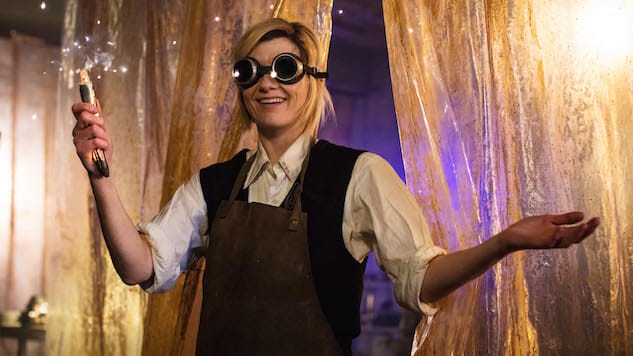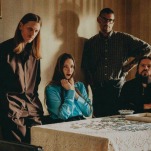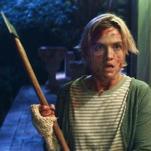In the Season Premiere of Doctor Who, Jodie Whittaker Proves Herself a Force to Be Reckoned With
(Episode 11.01)
Photo: Sophie Mutevelian/BBC America
Matt Brennan and Josh Jackson review Doctor Who each week in a series of letters.
Josh,
So, let me get this straight: Doctor Who is about an alien inventor and her human charges criss-crossing Sheffield to find a steaming, bioluminescent turnip, which hatches to reveal a merciless Robocop assassin from another planet, which is in fact an entity named Tim Shaw with its victims teeth embedded in its bubble gum blue face?
I jest, I jest. Well, kind of. As you know, though our readers may not, the season premiere of Doctor Who, “The Woman Who Fell to Earth,” is the first episode of the long-running adventure series I’ve ever seen, though I won’t pretend I wasn’t aware of bits and pieces. For example, that the Doctor is a “Time Lord,” though I’m still not quite sure what that is. Or that the gifted Jodie Whittaker (Black Mirror, Broadchurch) is the the 13th Doctor, and the first woman. Or that the TARDIS is a form of intergalatic transport in the shape of a police box.
Still, I was mostly flying blind here: I learned about the Sonic and a handful of its capabilities (the Swiss army knife analogy is ingenious); I developed a sense of the destabilizing metamorphosis that goes on when the Doctor assumes a new corporeal form ( “Right now, I’m a stranger to myself,” she says); and most potently, I started to understand why it’s such a beloved property. There’s a decency in “The Woman Who Fell to Earth,” a hopefulness, that I was immediately smitten with, which the Doctor sums up before she finally remembers who she is. “We’re all capable of the most incredible change,” she says. “We can evolve while still staying true to who we are. We can honor who we’ve been and choose who we want to be next.” If that isn’t a sublime statement of purpose for a TV series led by 13 different performers over the course of 30-some seasons and more than 800 episodes during a period of 55 years, I don’t know what is.
I have many questions, a few plaudits and, yes, one or two complaints, but I’m curious to hear more about what you made of it, as the Doctor Who expert here. In particular, I hope you found Whittaker as charming as I did: It strikes me that this is a property that relies pretty heavily on the Doctor being able to sell it convincingly, and she absolutely made me want to watch more.
—Matt

Matt,
I’m thrilled that after just one episode you get one of the key things I love about Doctor Who. The Doctor isn’t just an optimist, she’s the optimist. That hasn’t been true of every arc of every Doctor; that decency and hopefulness you mention has been put to the test by encounters with evil and great loss. The Doctor comes by her optimism honestly; not through blithe ignorance, but through more experience than is easy to imagine, and through a grounding in her encounters with humanity. She believes deeply in us for reasons that it’s often difficult to see. And she believes that statement of purpose.
And I’m already in love with Jodie Whittaker as the 13th Doctor because she’s a refreshing contrast to Peter Capaldi’s 12th, an atypically gruff incarnation, who was brilliant in his own portrayal but carried a deep sadness behind the Doctor’s eternal zest for life, which could sometimes seep through in the cutting sarcasm we came to love from The Thick of It’s Malcolm Tucker. The regeneration process, a genius device to keep the show ever-fresh with new faces, is like a re-birth. The Doctor is always the Doctor, but with different traits and likes and fashion style. Whitaker has more of the childlike wonder that Christopher Eccleston brought to the first of the rebooted Doctors, number nine back in 2005.
One of the other things you’ll quickly notice about the show is that it’s populated, once again, with the working-class British. Most sci-fi protagonists seem to be astrophysicists, military officers or other members of society’s elite, but Doctor Who, as I discussed yesterday with its new executive producers, rests upon the thin line between ordinary and extraordinary. That any of us—warehouse worker, traffic cop, bus driver—has the potential to do great things.
The plot of this particular episode was both fairly typical for the show and fairly unremarkable for a series that has given us very remarkable episodes. No one is going to be dressing as Tim Shaw at the next Comic Con alongside a million Weeping Angels and Daleks or recreating his “steaming, bioluminescent turnip.” The affects are as campy as ever, and the menace is just another alien wrecking his havoc on insignificant Earth. But it was a good introduction to our newest time-traveling heroes. A new Doctor and her new companions and the loss of a kindly grandma who shared the Doctor’s joie de vivre.
I’m excited to help guide your first encounter with Doctor Who, Matt. So fire away with those plaudits, complaints and questions.
—Josh

Josh,
Your description of Whitaker’s “childlike wonder” is on point, and dovetails nicely with one of my happiest first impressions: I’d always had the sense that Doctor Who had a winking self-awareness—and that it certainly does, as when the Doctor asks the very green police officer Yasmin Khan (Mandip Gill), “Why are you calling me ‘madam’?”—but as a very green Doctor Who viewer, I appreciated that the series’ sense of humor isn’t built on inside jokes. In fact, I laughed the hardest at Whittaker’s off-handed delivery of this piece of sage advice: “I never go anywhere that’s just initials.” She captures the episode’s madcap undercurrent brilliantly, without ever veering too far into mugging.
In addition to the class status of the Doctor’s new companions (“companions” is the term of art, right?), I also love how unobtrusively the series introduces racial/ethnic diversity into the mix, placing Yas and Ryan Sinclair (Tosin Cole) alongside Ryan’s step-grandfather, Graham (Bradley Walsh). That said, it remains an open question whether the series will mine this for material: Is it common for Doctor Who to tackle topical subjects within the context of its grand space adventures? To me, it’d be a shame not to—I don’t want to see “Why are you calling me ‘madam’?” left as a clever joke. I want to see the series confront what it might mean for the Time Lord to present as a human woman, rather than a man, particularly in the current political climate.
As for complaints, I could quibble with the dull epilogue that comes after Tim Shaw’s defeat and Grace’s death, but my main issue is one that could prove irksome through the rest of the season and beyond. The “strained” relationship between Ryan and Graham is awful, Josh. Like, laughably so. Like, literally: I actually chuckled out loud, and not in a nice way, when Graham sniped, “I suppose you’ll be blaming this on the dyspraxia as well? Can’t ride a bike, started an alien invasion?” Twenty minutes in, Ryan had been snippy with the old man on three separate occasions, none of them organic to the plot of the episode. I’m going to need the series to put some meat on these bones and explain their hostile relationship—more than “He married my grandma,” I mean—or back off it completely, otherwise by midseason it’s going to be grueling as hell.
My questions are not (yet) questions of basic understanding, in part because “The Woman Who Fell to Earth,” though unremarkable, does a terrific job of introducing key concepts from the series by building its explanations into the plot: It turns new viewers into the companions, piecing together what the heck is going on as the episode unfurls. (And I suspect there are likely to be plenty of new viewers, with Whitaker coming aboard.) As a critic, I’m more interested in general questions, which are sure to be answered as the season continues: What’s the balance between episodic adventures and serialization? What am I missing by having not seen the previous Doctors, to compare with Whittaker? How much of the companions’ backstories will we get? I’m glad that I have you here as a fellow, more experienced companion as I discover Doctor Who for the first time. Which leaves me with one last question:
Does Paste have a TARDIS I can borrow?
—Matt

Matt,
For better or worse, the universe of Doctor Who has been a relatively color-blind place. We’ll see if it’s also fairly gender-blind. The downside is some wasted opportunities to dig deep into the real problems of our past. But the show does explore morality in plenty of other ways, along with philosophy, technology, and human drama.
I agree, though, that the drama between step-grandfather and step-grandson feels poorly manufactured so far. Graham is clearly the least well-equipped to handle the idea of hurtling through time and space in constant danger but also the most ready to “evolve while still staying true to who we are,” thanks to the enduring presence of his now-deceased wife.
As far as what to expect: Be prepared for episodic adventures that can vary wildly in tone from horror to camp to action-adventure and even slapstick comedy. There will likely a couple two-episode arcs and a loose serialized plot thread weaving through all the adventures. You’ll probably get introduced to an iconic adversary or two, but you won’t need the entire backstory of that species. And you don’t to know the various versions of the Doctors who came before. Doctor Who is not a complicated show. It’s a show of possibilities and wonder. And I’m looking forward to exploring it with you this season.







































